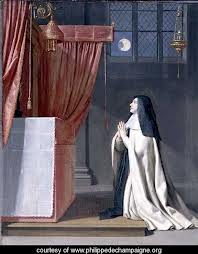This Sunday, at least in the Unites States, we celebrate the Solemnity of Corpus Christi. As with all special feast days in the Church, this one has a special history that was highlighted by Pope Benedict XVI in a 2010 homily.
The impetus behind this celebration was St. Juliana de Cornillon (d. 1258) who as a young orphan lived with Augustinian Nuns in a convent where she later became a sister herself. Graced at the age of 16 with mystical visions, she saw a “moon in its full splendour, crossed diametrically by a dark stripe. The Lord made her understand the meaning of what had appeared to her. The moon symbolized the life of the Church on earth, the opaque line, on the other hand, represented the absence of a liturgical feast for whose institution Juliana was asked to plead effectively: namely, a feast in which believers would be able to adore the Eucharist so as to increase in faith, to advance in the practice of the virtues and to make reparation for offenses to the Most Holy Sacrament. ”
Bishop Robert Torote of Liège was the first to introduce the Solemnity of Corpus Christi in his diocese. Later other Bishops followed his example.  Pope Urban IV, the once Archdeacon of Liège, in 1264 instituted the Solemnity of Corpus Christi on the Thursday after Pentecost as a feast of the universal Church. Pope Urban wrote, “Although the Eucharist is celebrated solemnly every day, we deem it fitting that at least once a year it be celebrated with greater honor and a solemn commemoration.”
Pope Urban IV, the once Archdeacon of Liège, in 1264 instituted the Solemnity of Corpus Christi on the Thursday after Pentecost as a feast of the universal Church. Pope Urban wrote, “Although the Eucharist is celebrated solemnly every day, we deem it fitting that at least once a year it be celebrated with greater honor and a solemn commemoration.”
This year, in fact, Pope Francis celebrated the feast on Thursday, May 30, 2013, while in the US we will celebrate it on Sunday, June 2, 2013. It was Pope Urban who asked St. Thomas Aquinas to compose the texts of the Liturgical Office for this great feast which are still in use in the Church today. St. Julliana herself was canonized in 1869 by Pius IX.
Pope Benedict closed out his homily by saying : The Saints never failed to find strength, consolation and joy in the Eucharistic encounter. Let us repeat before the Lord present in the Most Blessed Sacrament the words of the Eucharistic hymn “Adoro te devote”: [Devoutly I adore Thee]: Make me believe ever more in you, “Draw me deeply into faith, / Into Your hope, into Your love”.